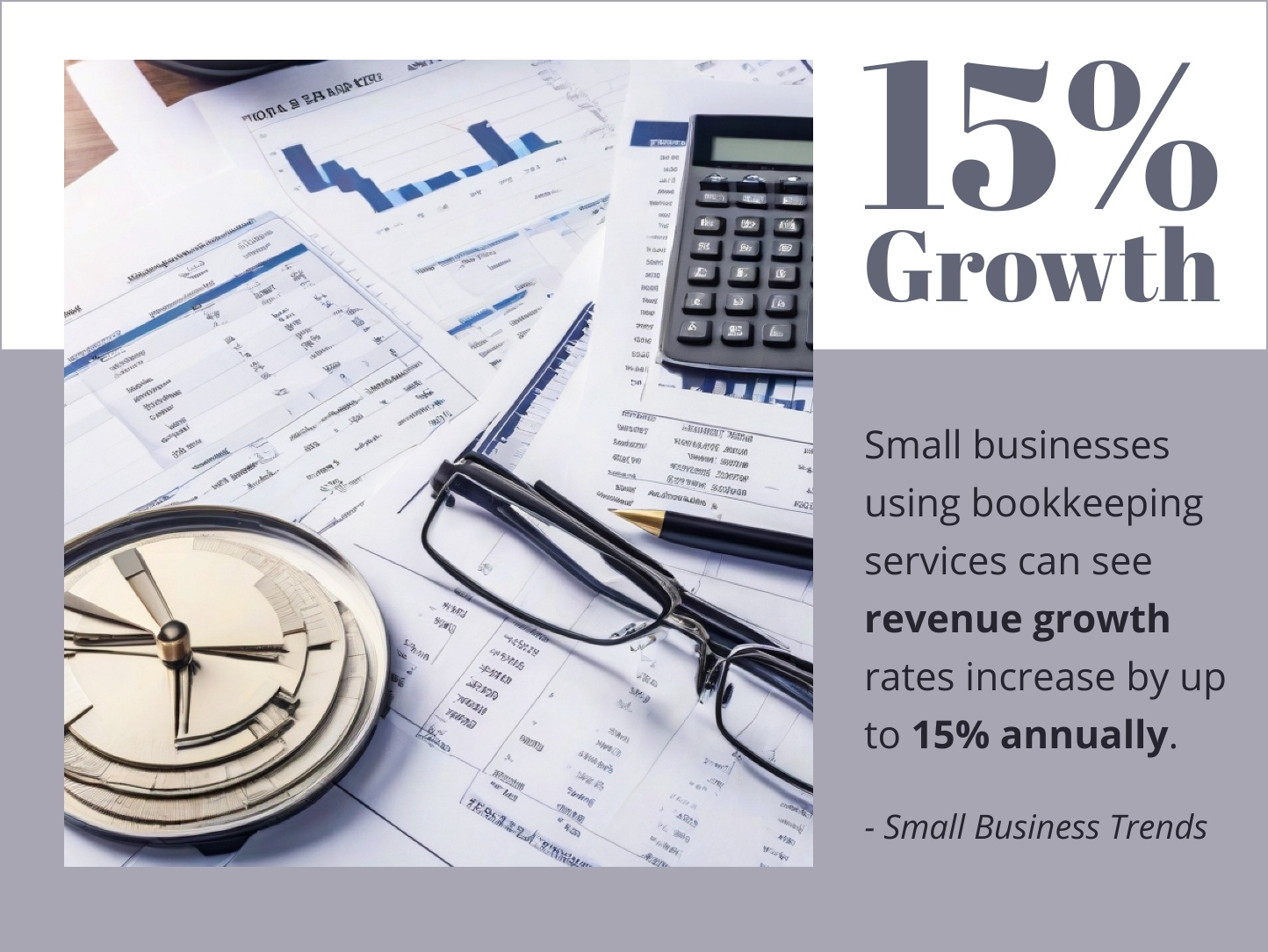In today's challenging and competitive business environment, small business owners wear many hats, from marketing and operations to customer service. Yet, one of the most critical roles often goes overlooked — maintaining accurate and efficient bookkeeping. Professional bookkeeping services are not just about balancing the books; they provide actionable financial insights, streamline operational processes, and help businesses achieve revenue growth. In fact, research indicates that small businesses using professional bookkeeping services can see revenue growth rates increase by as much as 15% annually. This article dives into why and how bookkeeping services serve as a catalyst for driving success in small businesses.

The Backbone of Financial Success
Professional bookkeeping services lay the foundation for a small business's financial health and scalability. Bookkeepers go beyond simply recording transactions; they organize and maintain systematic records, making it easier to track critical financial metrics like income, expenses, and profit margins. According to a study by Intuit QuickBooks, 89% of small businesses report improved financial understanding after implementing professional accounting services.
Improved understanding results in better decision-making, reduced expenses, and identification of opportunities to reinvest, all of which contribute to revenue growth. Keeping well-organized financial records ensures that businesses meet their compliance obligations and are well-prepared to scale.
Data-Driven Decision Making
Small businesses thrive when they make informed decisions, and bookkeeping plays a pivotal role in offering real-time financial insights. Professional bookkeepers provide comprehensive financial statements, including profit and loss statements, cash flow statements, and balance sheets, giving business owners a clear picture of their financial health.
A study by Deloitte found that companies practicing data-driven decision-making are 19 times more likely to be profitable. Having access to accurate and up-to-date financial data empowers small business owners to refine their business strategies, budget their expenses effectively, and allocate resources where they will have the highest return on investment.
Saving Time to Focus on Growth
One of the most significant benefits of hiring professional bookkeepers is the time savings for small business owners. Managing a business’s books requires dedication and hours of hard work — yet, small business owners typically lack the expertise to do so efficiently. Research from the U.S. Small Business Administration (SBA) indicates that small business owners spend an average of 120 work-hours annually on tasks related to financial management, including bookkeeping and tax preparation.

When outsourced to professionals, that time can be redirected toward core business functions, such as acquiring new clients, improving product offerings, and enhancing customer service. Time is money, and by outsourcing financial management, small business owners can better use their time to drive growth and profitability.
Improving Cash Flow Management
Cash flow is the lifeblood of any small business, yet an estimated 60% of small businesses worldwide struggle with cash flow problems, according to a 2023 QuickBooks survey. Poor cash flow is cited as one of the primary reasons businesses fail, with 82% of small business collapses being directly linked to ineffective cash flow management, according to a U.S. Bank study).
Professional bookkeepers play a crucial role in handling accounts receivable, payable, and payroll processes. By keeping track of when payments are due, ensuring invoices are sent promptly, and reconciling accounts systematically, bookkeepers help maintain a steady and predictable cash flow. This not only prevents financial strain but allows businesses to seize growth opportunities without hesitation.
Tax Compliance and Cost Savings
Navigating tax regulations can be a daunting task for small business owners. Poor record-keeping practices often result in overpaid taxes, missed deductions, or penalties due to errors in compliance. According to the National Small Business Association (NSBA), one in three small businesses report being audited due to inaccurate financial records.
By outsourcing to professional bookkeeping firms, small businesses can ensure accurate tax filing, maximize deductions, and avoid costly penalties. A report by Bench Accounting revealed that 40% of businesses using professional tax preparation saved an average of $10,000 annually through proper deductions and credits. Moreover, professional bookkeepers keep meticulous records, which are essential for meeting compliance requirements and reducing the stress surrounding tax season.

Financial Planning and Growth Strategy
One of the most powerful advantages of professional bookkeeping is the ability to forecast financial performance and create actionable growth plans. A report by PwC highlighted that businesses with precise financial forecasts are 2.5 times more likely to achieve revenue growth targets than those without.
Financial planning tasks facilitated by bookkeepers include:
By tracking these metrics, professional bookkeepers equip decision-makers with the tools to evaluate what’s working and what isn’t, ensuring future investments are strategic and productive.
Leveraging Technology for Better Results
Adopting modern technology amplifies the impact of professional bookkeeping services. Many bookkeeping firms are turning to cloud-based software, predictive analytics, and automated processes to streamline tasks. The Sage Practice of Now 2024 report revealed that small businesses using cloud-based accounting systems experienced up to 15% faster revenue growth compared to those still reliant on manual processes.
These tools allow for real-time updates and make collaboration with bookkeepers seamless, regardless of geographical location. Automation platforms also minimize errors in data entry, ensuring accuracy, and allowing business owners to focus on higher-priority tasks.
Scaling Efficiency with Professional Bookkeeping
While a solo entrepreneur may be able to handle limited transactions themselves, bookkeeping becomes complex as a business begins to scale. Outsourcing bookkeeping not only saves time but also ensures business compliance as operations grow. Outsourced accounting services cut operational costs by up to 40%, according to a report by Accounting Today.

Scalable bookkeeping solutions provided by professionals allow small businesses to grow their operation without the administrative burden holding them back. Moreover, professional bookkeeping services can help businesses evaluate hiring costs, implement technology, and determine the financial viability of expansion plans.
Preventing Fraud and Enhancing Security
Although small businesses are often considered low-risk for fraud, statistics reveal otherwise. According to the Association of Certified Fraud Examiners, small businesses lose an average of 5% of their annual revenue to fraud, with employee theft being one of the most common causes. One of the simplest ways to minimize financial fraud is having an expert set up proper oversight mechanisms.
Professional bookkeeping services often implement strict internal controls, conduct regular reconciliations, and maintain audit trails, reducing chances of errors or unauthorized transactions. Having a third-party professional also provides greater transparency and accountability within the organization.
Boosting Business Valuation for Investments
For small business owners looking to attract investors or sell their business, maintaining accurate and clean financial records is non-negotiable. A study by BizBuySell found that businesses with professional financial documentation can fetch 20–30% higher valuations compared to those with inconsistent or poor-quality records.
Professional bookkeepers ensure that financial records are detailed, well-organized, and ready for investor scrutiny — critical steps in securing external funding or arranging for a strategic sale.
Cost-Benefit: Is It Worth It?
While some small business owners may initially hesitate to invest in professional bookkeeping services, the cost-benefit ratio makes it a worthy decision. According to SCORE, for every $1 spent on professional financial services, businesses save $4 to $5 on penalties, tax preparation, and inefficient processes. Add to this the 15% revenue growth figure seen by businesses using professional services, and the ROI is clear.

Building a Strategic Partner
When small businesses hire professional bookkeepers, they gain more than just someone to manage their accounts. Bookkeepers often function as strategic advisors, helping businesses navigate through challenges, seize opportunities, and grow sustainably. In Sage’s “State of Accounting” report, over 89% of small businesses identified their professional accountants or bookkeepers as trusted business advisors.
This relationship creates a powerful foundation for growth as small businesses gain a reliable partner who deeply understands business success metrics and finances.
Looking Forward
While many small businesses view bookkeeping as a behind-the-scenes operational activity, the truth is that it directly influences a company’s revenue potential and overall success. From improved cash flow and greater tax savings to enhanced decision-making and fraud prevention, professional bookkeeping services offer countless benefits that empower small businesses to thrive.
With metrics like 15% annual revenue growth for businesses that outsource their bookkeeping, the financial and operational advantages are undeniable. For small business owners looking to save time, reduce costs, and achieve long-term growth, investing in professional bookkeeping services is not just a recommendation — it’s a necessity.







